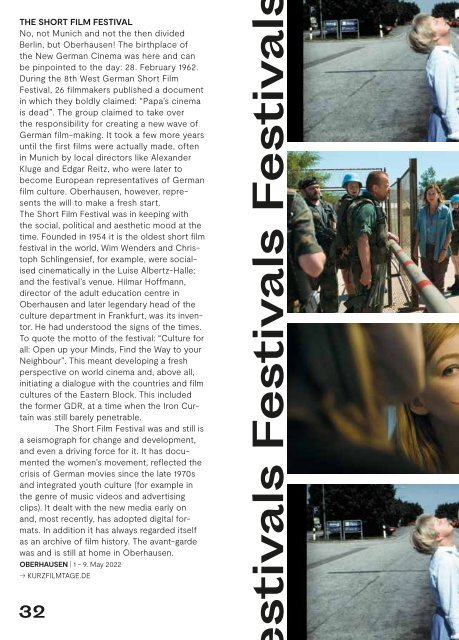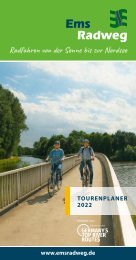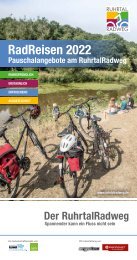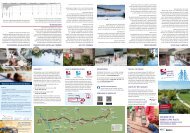Magazin „POLY“ - Free Guide 2022
Das englischsprachige Magazin „Poly“ führt durch das gesamte Ruhrgebiet und beleuchtet Kunst, Musik, Design und Gastronomie. Dazu gibt es Tipps, Empfehlungen und Einblicke in die kulturelle Landschaft der Metropole Ruhr. Magazine „POLY“ - Free Guide 2022 (english) One single city? No, lots of towns and cities. The Ruhrgebiet is often called "the city of cities". "Poly" will tell you how different they are and what they have in common. But most of all we want you to show you one thing: a constantly changing cultural scene and its transformative influence on the environment. For this is the motor behind new developments an radical changes. Poly leads through the Ruhr area and highlights art, music, design and gastronomy.
Das englischsprachige Magazin „Poly“ führt durch das gesamte Ruhrgebiet und beleuchtet Kunst, Musik, Design und Gastronomie. Dazu gibt es Tipps, Empfehlungen und Einblicke in die kulturelle Landschaft der Metropole Ruhr.
Magazine „POLY“ - Free Guide 2022 (english)
One single city? No, lots of towns and cities. The Ruhrgebiet is often called "the city of cities". "Poly" will tell you how different they are and what they have in common. But most of all we want you to show you one thing: a constantly changing cultural scene and its transformative influence on the environment. For this is the motor behind new developments an radical changes.
Poly leads through the Ruhr area and highlights art, music, design and gastronomy.
- No tags were found...
Create successful ePaper yourself
Turn your PDF publications into a flip-book with our unique Google optimized e-Paper software.
THE SHORT FILM FESTIVAL<br />
No, not Munich and not the then divided<br />
Berlin, but Oberhausen! The birthplace of<br />
the New German Cinema was here and can<br />
be pinpointed to the day: 28. February 1962.<br />
During the 8th West German Short Film<br />
Festival, 26 filmmakers published a document<br />
in which they boldly claimed: “Papa’s cinema<br />
is dead”. The group claimed to take over<br />
the responsibility for creating a new wave of<br />
German film-making. It took a few more years<br />
until the first films were actually made, often<br />
in Munich by local directors like Alexander<br />
Kluge and Edgar Reitz, who were later to<br />
become European representatives of German<br />
film culture. Oberhausen, however, represents<br />
the will to make a fresh start.<br />
The Short Film Festival was in keeping with<br />
the social, political and aesthetic mood at the<br />
time. Founded in 1954 it is the oldest short film<br />
festival in the world. Wim Wenders and Christoph<br />
Schlingensief, for example, were socialised<br />
cinematically in the Luise Albertz-Halle;<br />
and the festival’s venue. Hilmar Hoffmann,<br />
director of the adult education centre in<br />
Oberhausen and later legendary head of the<br />
culture department in Frankfurt, was its inventor.<br />
He had understood the signs of the times.<br />
To quote the motto of the festival: “Culture for<br />
all: Open up your Minds, Find the Way to your<br />
Neighbour”. This meant developing a fresh<br />
perspective on world cinema and, above all,<br />
initiating a dialogue with the countries and film<br />
cultures of the Eastern Block. This included<br />
the former GDR, at a time when the Iron Curtain<br />
was still barely penetrable.<br />
The Short Film Festival was and still is<br />
a seismograph for change and development,<br />
and even a driving force for it. It has documented<br />
the women’s movement, reflected the<br />
crisis of German movies since the late 1970s<br />
and integrated youth culture (for example in<br />
the genre of music videos and advertising<br />
clips). It dealt with the new media early on<br />
and, most recently, has adopted digital formats.<br />
In addition it has always regarded itself<br />
as an archive of film history. The avant-garde<br />
was and is still at home in Oberhausen.<br />
OBERHAUSEN | 1 - 9. May <strong>2022</strong><br />
→ KURZFILMTAGE.DE<br />
stivals Festivals Festivals<br />
ARTY<br />
POLY MAG <strong>2022</strong><br />
32<br />
FILM STILL FROM “LYDIA”, 2021<br />
© TIAN BECKER<br />
A SCENE FROM “QUO VADIS, AIDA”, 2021<br />
© DEBLOKADA/ CHRISTINE A. MAIER<br />
A SCENE FROM “ICH HABE DICH GELIEBT”, 2021<br />
© ROSA HANNAH ZIEGLER<br />
FILM STILL FROM “LYDIA”, 2021<br />
© TIAN BECKER<br />
THE DUISBURG FILM WEEK<br />
Barely 20 kilometres away from Oberhausen, a second festival<br />
has been taking place in Duisburg since 1977/78. In terms of<br />
content, there is no denying the overlaps with the Short Film<br />
Festival. That said, the Duisburg Film Week, which sees itself<br />
as a forum for exchange and encounters between film-makers<br />
and audiences, is devoted exclusively to documentary films. In<br />
the old Federal Republic of Germany it thus made a claim to<br />
be the sole representative of the genre. In the former GDR, the<br />
Leipzig Week for Cultural and Documentary Film has existed<br />
as an older sister since 1955. Today both festivals are in productive<br />
competition with each other. Documentary films are<br />
wrongly regarded as being more austere than feature films. This<br />
was utterly different at the beginning of the genre, when they<br />
had an almost revolutionary effect on audiences. The 1920s<br />
and 30s, for example, were immensely innovative, featuring<br />
names like Robert Flaherty, Walter Ruttmann, Dsiga Wertow<br />
and Leni Riefenstahl. Over the last three decades, documentary<br />
films have enjoyed new popularity. Michael Moore<br />
in the USA is not the only one to take the credit for this. The<br />
Duisburg Film Week with its long-time director Werner Ruzicka<br />
(1985 to 2018) has also played a part in this process of emancipation.<br />
Its awards have drawn our attention to important artists<br />
like Harun Farocki, Thomas Heise, Romuald Karmakar, Volker<br />
Koepp and Werner Schroeter.<br />
DUISBURG | November <strong>2022</strong><br />
→ DUISBURGER-FILMWOCHE.DE<br />
THE INTERNATIONAL<br />
WOMEN'S FILM FESTIVAL<br />
If they do not belong to A-category festivals like the big three<br />
in Berlin, Cannes and Venice, film festivals need their own<br />
unique character, a special point of view. Although it cannot<br />
be said that women are a minority, films made by women are.<br />
When compared to the male-dominated film world, a list of<br />
female directors is still pretty short. Margarethe von Trotta and<br />
Maren Ade, Liliana Cavani and Lina Wertmüller, Jane Campion,<br />
Kathryn Bigelow and Chloé Zhao cannot be counted in dozens.<br />
The International Women’s Film Festival (IFFF) in Dortmund and<br />
Cologne has existed since 2006. It resulted from a merger of the<br />
“femme totale” festival in Dortmund and the “feminale” festival<br />
in Cologne – both of which were founded in the 1980s – and<br />
is now the most important festival of its kind in Germany. The<br />
criterion for participation is that the films must be directed and/or<br />
produced by women. Sections like international feature films, the<br />
Debut Competition and the Panorama series, focus on specific<br />
countries and themes, queer cinema and children’s and youth<br />
programmes open our eyes to a female perspective.<br />
DORTMUND | 15. - 20. June <strong>2022</strong><br />
→ FRAUENFILMFEST.COM<br />
POLY MAG <strong>2022</strong><br />
33















